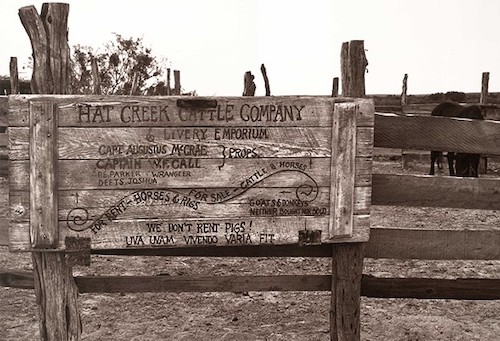
Welcome to Lonesome Dove
"Uva Uvam Vivendo Varia Fit"
We Don't Rent Pigs
My musing today revolves around the movie Lonesome Dove and the cryptic sign Gus scrawled on some old boards he tacked together to advertise their otherwise visually unprepossessing Hat Creek Cattle Company. There is a scene in the movie when Capt. Call and Gus were bantering back and forth about Gus insisting on bringing the decrepit old sign along on their cattle drive to Montana. It went as follows:
Woodrow: That was a dang stupid thing to do–bringing that old sign along–you'll have us the laughingstock of the whole country–with that–we don't rent pigs part.
Gus: Well, we don't rent pigs and I figure its better to say it right up front cause a man that does like to rent pigs is… he's hard to stop.
Woodrow: And if that ain't bad enough you got all them Greek words on there too.
Gus: I told you Woodrow along time ago, it ain't Greek its Latin.
Woodrow: Well, what does it say that Latin?
Gus: Well, it's a motto, it just says itself, Yovaro yovaro fit yovaro….
Woodrow: You don't have no idea what it says. You found that in some old book or something. For all you know it invites people to rob us!
Gus: Well, first man that comes along that can read Latin is invited to rob us as far as I'm concerned. I'd like the chance to shoot at a educated man once in my life.
As humorous as the narrative was, it brings the whole movie into focus through the lens of that misspelled quote from Gus, who though imperfectly educated, had a philosophical idealistic outlook on life, as opposed to Woodrow, who was practical and pragmatic to a fault. The two of them together complemented each other — as did many other characters in the film.
The original Latin phrase, that Gus obviously did not understand, sounded "high toned" and fit his flamboyant nature. The sign appears early in the story and reappears symbolically. It's probable meaning refers to grapes ripening together with each grape's character influenced by the others. In the novel, only the top plank ("Hat Creek Cattle Company and Livery Emporium") survives the journey to Montana and marks Gus's grave, emphasizing loss and impermanence.
This theme was brought to a head when Woodrow stood in front of the now abandoned ranch and was approached by a reporter seeking an impromptu interview. Woodrow, who was lost in reverie, heard only this from the reporter's fawning questions: "They say you are a man of vision." As the visions of all those he knew and loved, and those he loved and lost, passed before his mind's eye, his response was a sad and weary: "Yeah, hell-of-a vision."
It has been said that our purpose for living is what we do. Our actions here on this mortal coil determine not only our destiny, but the destiny of every other person we touch. In the film's context, this could mean "character is destiny" — individuals evolve according to their inherent nature, shaped by their experiences and companions.
Is there a moral to this story? If there is, it is to live life to its fullest and hold yourself and everyone else to account, no matter what path you follow — now, let's cowboy-up and get-er-done!
Dan Stewart
POBox 384
Cliff, NM 88028










